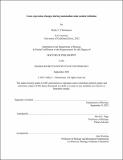Gene expression changes during mammalian male meiotic initiation
Author(s)
Christensen, Holly C.
DownloadThesis PDF (8.430Mb)
Advisor
Page, David C.
Terms of use
Metadata
Show full item recordAbstract
In sexually reproducing organisms, germ cells can divide by mitosis, which generates daughter cells that are genetically identical to the mother cell, or meiosis, which divides the genome for haploid gamete generation. Germ cells undergo meiotic initiation, the transition from the mitotic cell cycle to the meiotic cell cycle, once in a generation. In mammals, genetic studies have identified key regulators of meiotic initiation. However, a holistic assessment of the transcriptional changes during meiotic initiation has not been performed. In this thesis, we describe the transcriptional changes that occur during meiotic initiation in male mice.
Previously, obtaining pure populations of male germ cells right before, during, and immediately after meiotic initiation was not experimentally achievable. Using the 3S method, which combines spermatogenesis synchronization, lineage tracing, and cell sorting, we obtained pure populations of undifferentiated Type A spermatogonia, Type B spermatogonia, STRA8- preleptotene spermatocytes, loSTRA8 preleptotene spermatocytes, hiSTRA8 preleptotene spermatocytes, and leptotene spermatocytes. Following transcriptome sequencing, data analysis showed several different patterns of gene expression during meiotic initiation, but the largest groups of genes showed either increased or decreased expression across the time course. While the genes whose expression increased at meiotic initiation were enriched for functions in meiotic prophase I, the genes whose expression decreased at meiotic initiation were enriched for housekeeping processes, including mRNA and protein regulation. Both upregulated and downregulated genes were expressed throughout the time course, but their expression levels were modulated at meiotic initiation. By performing motif enrichment analysis at the proximal promoters, we identified YY1 as a potential regulator of the genes whose expression decreases at meiotic initiation. In taking a descriptive experimental approach we identified novel gene expression changes during meiotic initiation, which furthers our understanding of germ cell biology.
Date issued
2021-09Department
Massachusetts Institute of Technology. Department of BiologyPublisher
Massachusetts Institute of Technology